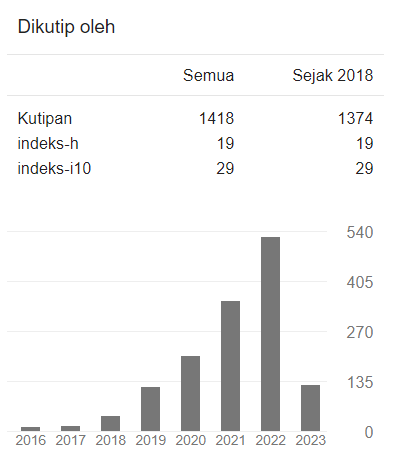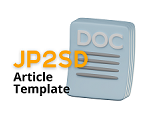Behavioristic Approach Strategy Fostering a Spirit of Nationalism in the Elementary School Teacher Education Study Program
DOI:
https://doi.org/10.22219/jp2sd.v12i1.27539Keywords:
Nationalism, Education, Strategy, LearningAbstract
The research aimed to explore and analyze strategies for fostering nationalistic attitudes in students of the Primary School Teacher Education Study Program through a Behavioristic approach to learning Citizenship Education. The research method employed descriptive qualitative research with the aim of finding out behavioristic strategies for fostering a nationalistic attitude and how to foster a nationalistic attitude through a behavioristic approach. Techniques for collecting data through interviews and document analysis are related to the use of a Behavioristic approach in learning Citizenship Education. The findings indicated that an effective strategy for fostering nationalistic attitudes in students in the Primary School Teacher Education Study Program is through a Behavioristic approach. First, the use of positive reinforcement is an effective strategy for strengthening nationalist attitudes. In the learning context, positive reinforcement can be provided through recognition and appreciation for students' active participation in activities related to citizenship, such as flag ceremonies, national day commemorations, or citizenship projects. Second, learning that involves direct experience and practical application has also proven effective in fostering nationalistic attitudes. By presenting real situations that are relevant to national values, such as visits to historical places or participation in social activities related to society, students can directly experience nationalist values and internalize them. The implications of this research can be used as a guide for lecturers and instructors in designing learning strategies that can strengthen students' nationalist attitudes.
Downloads
References
Azhari, I., Sidiq, R., & Purnamasari, I. (2022). The role of newspapers published in North Sumatra during Indonesia's independence struggle between 1916-1925: A discourse analysis. F1000Research, 11(249), 249.
Annava, V. A., Yulianto, B. A., Suwarno, P., Widodo, P., & Saragih, H. J. R. (2023). The Four Pillars of Nationality The Republic of Indonesia as Consensus Basis for Formation National Character in Conflict International Responses. International Journal of Social Science Research and Review, 6(2), 511-520.
Ansori, M. (2020). Dimensi HAM dalam Undang-undang Sistem Pendidikan Nasional Nomor 20 Tahun 2003. Iaifa Press.
Bourchier, D. M. (2019). Two decades of ideological contestation in Indonesia: From democratic cosmopolitanism to religious nationalism. Journal of Contemporary Asia, 49(5), 713-733.
Bryan, D. (2019). The chase across the globe: International accumulation and the contradictions for nation states. Routledge.
Cox Jr, R. B., deSouza, D. K., Bao, J., Lin, H., Sahbaz, S., Greder, K. A., ... & Arredondo-Lopez, A. (2021). Shared language erosion: Rethinking immigrant family communication and impacts on youth development. Children, 8(4), 256.
Creswell, J. W., & Poth, C. N. (2016). Qualitative inquiry and research design: Choosing among five approaches. Sage publications.
Chu, Z. (2022). Value: From Nationalism to People-centered Orientation. In People-Oriented Education Transformation (pp. 79-111). Singapore: Springer Nature Singapore.
Calzada, I. (2020). Emerging citizenship regimes and rescaling (European) nation-states: Algorithmic, liquid, metropolitan and stateless citizenship ideal types. In Handbook on the Changing Geographies of the State (pp. 368-384). Edward Elgar Publishing.
Cichocka, A., & Cislak, A. (2020). Nationalism as collective narcissism. Current Opinion in Behavioral Sciences, 34, 69-74.
Darwati, S. P. (2022). NASIONALISME DAN PERGERAKAN KEBANGSAAN INDONESIA. Penerbit Lakeisha.
Dahnial, I., Dwiningrum, S. I. A., & Wuryandani, W. (2021). The Mind of SM Amin Medan City Nationalism Figure during Independence. Psychology and Education Journal, 58(2), 3818-3825.
De Keere, K., & Spruyt, B. (2019). ‘Prophets in the pay of state’: The institutionalization of the middle-class habitus in schooling between 1880 and 2010. The Sociological Review, 67(5), 1066-1085.
Egry, G. (2019). Negotiating Post-Imperial Transitions: Local Societies and Nationalizing States in East Central Europe.
Glaser, M. (2020). Milton Glaser: graphic design. Abrams.
Haley, R., Prance, J., & Zumbühl, D. (2021). Breaking the millikelvin barrier in nanoelectronics. Europhysics News, 52(4), 26-29.
Isroani, F., & Huda, M. (2022). Strengthening Character Education Through Holistic Learning Values. QUALITY, 10(2), 289-306.
Jowers, R. F., Brunsdon, J. J., Peterson, J. T., Mitchell, H. L., & Curtner-Smith, M. D. (2021). Influence of occupational socialization on sport Pedagogy doctoral students’ beliefs and actions. Journal of Teaching in Physical Education, 41(2), 175-183.
Keane, M., Yu, H., Zhao, E. J., & Leong, S. (2020). China's Digital Presence in the Asia-Pacific: Culture, Technology and Platforms. Anthem Press.
Kohn, H. (2022). A History of Nationalism in the East. Taylor & Francis.
Keynes, M. (2019). History Education, Citizenship, and State Formation. Handbook of Historical Studies in Education: Debates, Tensions, and Directions, 1-16.
Liechty, M. (2022). Media, markets, and modernization: youth identities and the experience of modernity in Kathmandu, Nepal. In Youth cultures (pp. 166-201). Routledge.
Mendus, A. (2021). Alys Troubling Steiner Waldorf Education. In Searching for the Ideal School around the World (pp. 86-118). Brill.
Peters, M. A., Arndt, S., Tesar, M., Jackson, L., Hung, R., Mika, C., ... & Gibbons, A. (2022). Philosophy of education in a new key: A collective project of the PESA executive. Educational Philosophy and Theory, 54(8), 1061-1082.
Robinson, K. (2020). Housemaids: The effects of gender and culture on the internal and international labor migration of Indonesian women. In Intersexions (pp. 33-51). Routledge.
Rodríguez-Abitia, G., Martínez-Pérez, S., Ramirez-Montoya, M. S., & Lopez-Caudana, E. (2020). Digital gap in universities and challenges for quality education: A diagnostic study in Mexico and Spain. Sustainability, 12(21), 9069.
Sahertian, P., & Jawas, U. (2021). Culture and excellent leaders: the case of indigenous and non-indigenous Indonesian leaders. Heliyon, 7(11), e08288.
Sharafutdinova, G. (2022). Public opinion formation and group identity: the politics of national identity salience in post-Crimea Russia. Problems of Post-Communism, 69(3), 219-231.
Schilde, K. (2023). Weaponising Europe? Rule-makers and rule-takers in the EU regulatory security state. Journal of European Public Policy, 30(7), 1255-1280.
Wijaya, S. (2019). Indonesian food culture mapping: a starter contribution to promote Indonesian culinary tourism. Journal of Ethnic Foods, 6(1), 1-10.
Wolfe, S. E., & McLean, K. (2021). Is it un‐American to view the police as illegitimate? The role of national identity in the legal socialization process. Journal of Social Issues, 77(2), 577-599.
Zajda, J. (2021). Globalisation and education reforms: Creating effective learning environments (Vol. 25). Springer Nature.
Downloads
Published
Issue
Section
License
Copyright (c) 2024 Irfan Dahnial, Karina Wanda, Rakhmat Wahyudin Sagala

This work is licensed under a Creative Commons Attribution-ShareAlike 4.0 International License.
Authors who publish with Jurnal Pemikiran dan Pengembangan Sekolah Dasar (JP2SD) agree to the following terms:
- For all articles published in Jurnal Pemikiran dan Pengembangan Sekolah Dasar (JP2SD), copyright is retained by the authors. Authors give permission to the publisher to announce the work with conditions. When the manuscript is accepted for publication, the authors agree to automatic transfer of the publishing right to the publisher.
- Authors retain copyright and grant the journal right of first publication with the work simultaneously licensed under a Creative Commons Attribution-ShareAlike 4.0 International License that allows others to share the work with an acknowledgment of the work's authorship and initial publication in this journal.
- Authors are able to enter into separate, additional contractual arrangements for the non-exclusive distribution of the journal's published version of the work (e.g., post it to an institutional repository or publish it in a book), with an acknowledgment of its initial publication in this journal.
- Authors are permitted and encouraged to post their work online (e.g., in institutional repositories or on their website) prior to and during the submission process, as it can lead to productive exchanges, as well as earlier and greater citation of published work (See The Effect of Open Access).

This work is licensed under a Creative Commons Attribution-ShareAlike 4.0 International License.


















